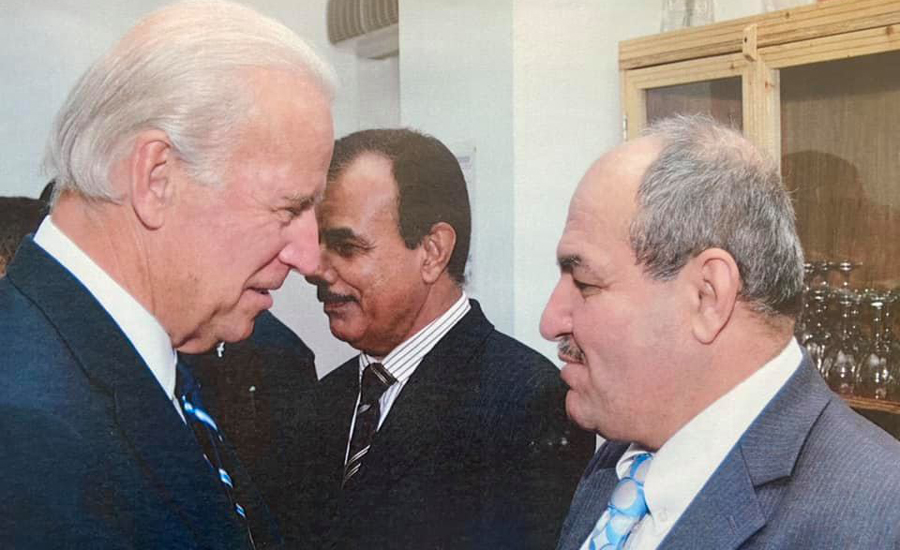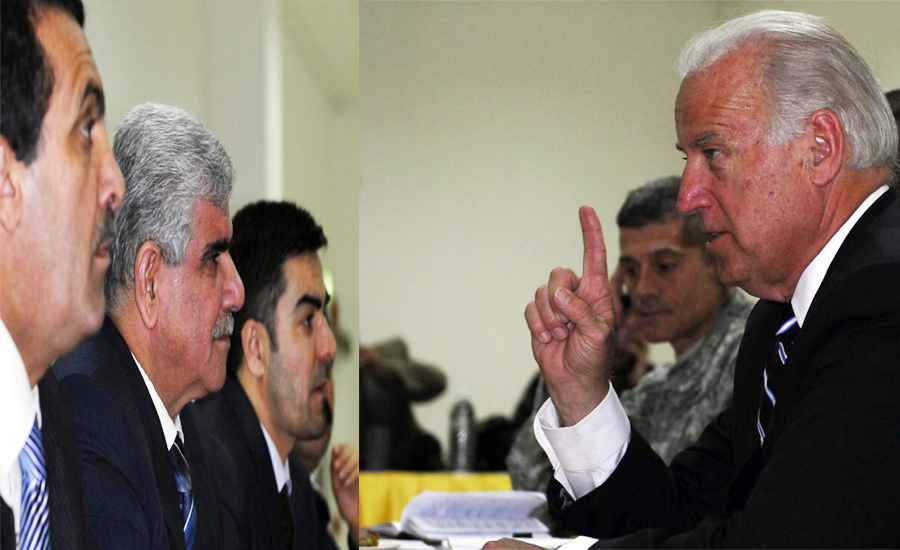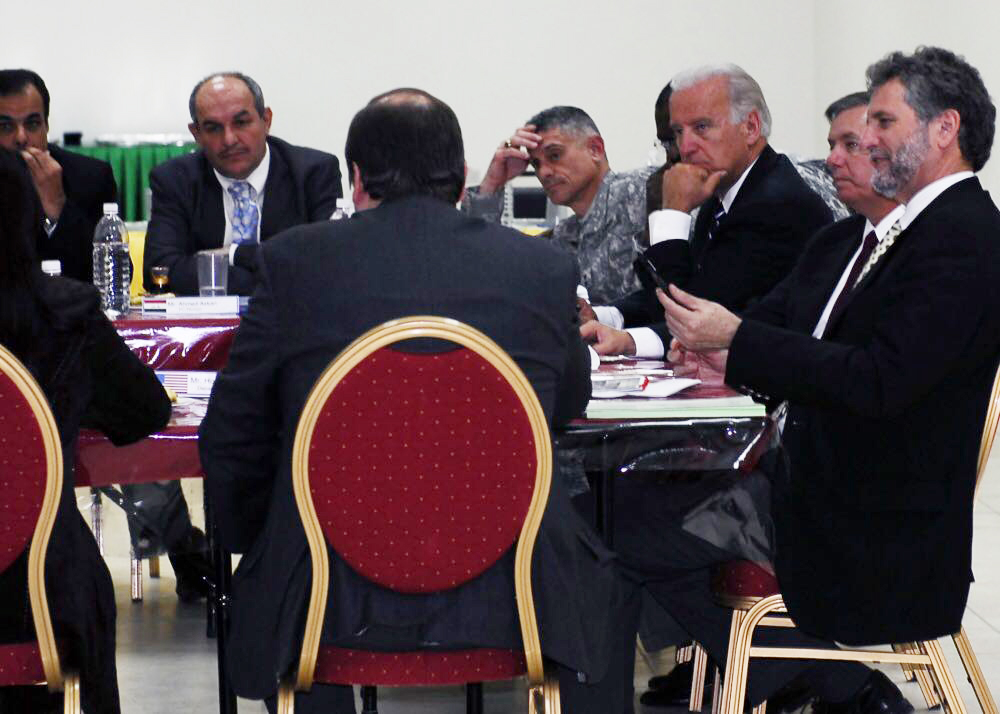"Kirkuk is probably the biggest flashpoint," is what Joe Biden, President-elect of the United States, had said eleven years ago during a visit to Kirkuk province, where he met with the different components of the province, according to Kurdish officials. In the meeting, Biden had spoken about the disunity among the components of the province and had said, "We will leave Iraq, in case a dictator worse than Saddam Hussein takes power, we will not interfere since you do not have a project for coexistence."
Biden’s visit was meant to give advice to representatives of Kirkuk’s different ethnicities and to listen to them. But he leaves the province disappointed as he realizes the different sides have different visions for the future of the province. At the meeting, Biden asks them to "agree on one program and restore pride to the people of Kirkuk," so that he could also talk to Baghdad about this.
The meeting, which was held on 13 January 2009 at the Kirkuk Airport, coincided with the tensions related to the provincial elections in Iraq, which was scheduled to take place at the end of January that year. But the biggest dispute was between Baghdad and Erbil over the mechanism for Kirkuk's participation in the elections.
The meeting also coincided with a strong dispute between the Iraqi prime minister at the time, Nuri al-Maliki, and the former president of the Kurdistan Region, Masoud Barzani, which centered on Kirkuk.

It is not clear whether that was Joe Biden's first visit to Kirkuk or not, but Ahmed Askari, a former member of the now dissolved Kirkuk provincial, who participated in the meeting, told KirkukNow: "Joe Biden was one of the American leaders who after that paid the most visits to Iraq and Kirkuk. He had an accurate insight into the situation in the region and used to have special relations with well-known personalities from the Kurds, Arabs and Turkmen.”
Ahmed Askari, who had spoken closely with Joe Biden, said: "Biden and his entourage played the role of advisers and talked about the geographical importance of Kirkuk, and pointed out that the Ba'ath government tried for years to sow the division between the nationalities of Kirkuk."
According to Askari, Joe Biden, who is now the US president-elect, had said at the meeting that took place eleven years ago: "We ask you to return to your past when you lived in harmony together. We want to return this pride to the people of Kirkuk. We want you to agree on a program regarding Kirkuk, and we will talk with the Iraqi government and be of help to you.”
We ask you to return to your past when you lived in harmony together. We want to return this pride to the people of Kirkuk
According to KirkukNow sources, the contents of the programs that representatives of Kirkuk components presented to Joe Biden were far from each other. The Kurds demand the annexation of Kirkuk to the Kurdistan Region, and the Arabs stress that Kirkuk belongs to Iraq and demand that it remain as it is, while the Turkmen demand that the province be turned into a federal region.
Muhammad Kamal, a member of the dissolved Kirkuk Provincial Council and a member of the leadership council of the Kurdistan Democratic Party, told KirkukNow: "Before Biden’s arrival, we knew he was coming to talk and to find solutions. So, we, as the Brotherhood list – a majority-Kurdish list – prepared an official memorandum in advance and presented it to him. When Biden asked all the components to adopt a unified project, we expressed our readiness for that, but that did not happen later."

And Muhammad Kamal pointed out that "Biden was upset about the incompatibility of the components of Kirkuk," adding, "Biden said, ‘we will leave Iraq, and if then a dictator worse than Saddam Hussein takes power, we will not interfere, since you do not have a project for coexistence."
At the end of the meeting, Rakan Jibouri, the current acting governor of Kirkuk, deputy governor at the time, asks Biden, “Are you not that person who owns a project in the name of the Biden project?" In response to that, Biden says, "That's what the media say about me, but that project is now an American project that is on the shelves of the US Senate in my name, and it received 75 votes out of a total of 100 votes. That project was a viable solution for Iraq, "according to Muhammad Kamal, who retold the conversation that took place between Rakan Jibouri and Joe Biden to KirkukNow.
Are you not that person who owns a project in the name of the Biden project?
The project was to decentralize Iraq into three regions, a Kurdish one, a Shi’a one and a Sunni one.
According to a report published on 24 November 2009 in the New York Times, the main goal behind Joe Biden's visit to Kirkuk was to seek to resolve the issues around elections and to find out the causes of the deep disputes over Kirkuk province.
The visit was to closely examine the situation in Kirkuk between the efforts of former Kurdistan Region President Masoud Barzani to conduct the referendum and the former Iraqi Prime Minister Nuri al-Maliki, who was opposed to these efforts, according to the report.
During Joe Biden's visit to Iraq in 2009, Masoud Barzani was trying to use the disputes on the elections as an opportunity to hold the referendum that also included Kirkuk. But Arabs in Kirkuk obstructed his efforts and objected.
The report also points out that Biden’s visit to Kirkuk coincided with the escalation of tensions between Arabs and Kurds. "There was no sign of progress on the status of Kirkuk, which Kurds considered integral to their identity but which large populations of Arabs and Turkmen also claimed as their own.”
footage of the Biden’s visit to Kirkuk in 2009
“The 8.5 billion barrels of oil reserves estimated to be beneath Kirkuk made it a prize no one was willing to yield,” the report adds.
According to the information referred to in the same report, Iraqi officials preferred Joe Biden to intervene as a mediator or a third party to resolve the issues, in which Kirkuk was the main point of contention.
“Maliki gave his blessing to a proposal that Biden press Masoud Barzani, the president of the Kurdistan Regional Government, to postpone plans to hold a referendum on the Kurdish Constitution, which would have unilaterally absorbed Kirkuk,” according to the report.
On 20 January that year, Biden officially becomes U.S. VP.
American media channels, including CNN, reported that after his return to Washington, Biden did not hide his fear of increasing tensions and disputes in Kirkuk due to the conflicts between KRG and Baghdad.
after his return to Washington, Biden did not hide his fear of increasing tensions and disputes in Kirkuk
After his visit, Biden, therefore immediately calls Christopher Hill, the former US ambassador to Iraq, and General Odierno, the commander of American-led forces. He was also in constant contact with Maliki, Barzani, and other ruling figures.
“Biden pressed Maliki to carry through on plans to visit Kurdistan, and he pressed Barzani to postpone the referendum. He asked each man to stop describing the other as an enemy of peace,” according to the report.
The report says that Qubad Talabani, the representative of the Kurdistan Regional Government to the U.S. at the time, that Biden had told Barzani it would be “unhelpful’ if the Kurds held their referendum, as “Arab outrage at the Kurdish annexation of Kirkuk could increase ethnic violence.”
Months after his visit to Kirkuk, on the 2 June 2009, during an interview, in response to a question by ABC’s George Stephanopoulos, Joe Biden answers:
“The United Nations has started a process to deal with what they called the ‘disputed internal borders.’
Kirkuk is probably the biggest flashpoint. And we were asked that we would -- would we be helpful to the United Nations in doing this? I was further asked that would I communicate to the Kurdish leadership, who I have a close relationship with, that their passing a constitution through their parliament in Kurdistan was not helpful to the process that was under way.”
Kirkuk is probably the biggest flashpoint
According to American media outlets, Biden succeeded at that time in urging Baghdad and the KRG to reach an agreement and hold provincial elections on 31 January 2009. But Kirkuk was excluded from those elections.
After that visit in 2009, Joe Biden visited Iraq several more times. But Ahmed Askari says that they had not received any special messages from Biden about Kirkuk after the 2009 visit.
Joe Biden defeated Donald Trump in the U.S. presidential elections earlier this month.
Ahmad Askari added: “We hope that Joe Biden's presidency will be a helpful factor in improving conditions in Kirkuk and resolving problems between Baghdad and the Kurdistan Region.”
"When he visited Kirkuk at the time, Biden was a senator, and then he became vice president. Perhaps his decisions were not effective at the time, but he is now the president, and we all know what the president's powers are, so he may be able to help solve some [of our] problems."





